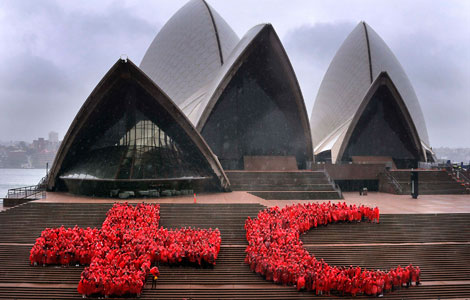

|
Peng Xiancheng and Hubert Kollmar have a common mission in the leather industry. Fu Jing / China Daily |
German consultant helps Chinese boss bring company up to international satndard
After 30 years firing up his chemical business in China, Peng Xiancheng is changing his formula for international success.
Most joint enterprises operate between major Chinese and foreign companies, but the self-made entrepreneur has struck up a partnership on a more personal basis, one that he hopes will help transform the way his company is run and turn it into a global player.
"I embarked on the road to this goal two years ago by turning my company into a 'business management school'," says Peng over dinner at a restaurant in Deyang, Sichuan province, where his company Decision Chemical is based.
"And he's the dean," he adds, pointing across the table to Hubert Kollmar, a German who has spent close to 15 years in senior management in chemical multinationals' operations in China and Brazil.
And the key subject they have in common is the leather industry.
Peng first worked in a local chemical factory after finishing high school in the early 1980s - and ended up heading the company. In 1995, he set up his own company, selling at first from a motorcycle with his partner, and which is now one of China's leading providers of leather chemical technology with more than 200 employees.
He says Decision Chemical has been increasing turnover and profit in recent years, but true to the company name, three years ago he made a big decision to change.
"I wanted to challenge our company's potential and aim to become the green and high-tech leader of the global leather chemical industry," he says. "And that required an innovator to guide us."
He did not have far to look. At that time, Kollmar was thinking of spending more time with his family in Germany, having worked in senior management for chemical multinationals Clariant in South America and BASF in Shanghai for nine years.
But Kollmar's extensive experience in sales and marketing of leather chemical products was of little use in finding a job in Germany as these were now all manufactured abroad. So he decided to set up his own consulting company Hubert Rudolph Kollmar Management UG, specializing in coaching, training, interim management and consulting in the leather industry.
Because of his reputation in the industry in China, Kollmar was quickly spotted by Peng, and at their first meeting, the German was appointed chief operating officer of Decision Chemical.
Part of the deal was that Kollmar would spend one month in three in Germany with his family.
The leather chemical industry is dominated by five global companies, including BASF and Clariant, which account for nearly half of the market share globally and in China.
"But we want to become the leading company in China with international standards," says Kollmar, mentioning a plan to double Decision Chemical's 3.5 percent share of the market within a few years.
He identified the company's strengths and weaknesses in comparison with similar sized competitors. They had more business lines, and Decision Chemical was more focused in one sector. But it was well connected with universities in China and overseas big on chemical research.
"This is an advantage for us to become competitive by boosting research and development projects," Kollmar says.
Decision Chemical is working with Sichuan University in Chengdu and Northampton University in England, both renowned for leather chemical research.
With reference to R&D, Peng says chrome tanning is the most common procedure used in producing quality leather. But about half the chrome and 15 percent of other chemicals are retained in finished leather, and the rest is disposed of.
Peng, whose company provides more than 100 chemicals for tanneries, says his mission is to maximize efficiency in the use of chrome and minimize the amounts of hazardous byproduct.
"Indeed, I hope the use of chrome can be replaced soon," Peng says.
Kollmar says he is working on improving health and safety, environmental care and product quality.
"The company is very dedicated and is keen for advice to go this route and conform to international standards," he says.
This has involved the training of sales and marketing staff, technicians and managers, and seeking out highly qualified human resources, R&D, technical and finance officers to help.
The extent and pace of the changes has caused upheaval in the way the company is run; hence, the new "management school" attitude.
"It's been a tough two years for me," says Peng, referring to his responsibility for harmonizing thoughts among the management, to help them realize the importance of the reforms mainly proposed by Kollmar.
Kollmar says the first year was frustrating for him, but now the staff is getting used to his ideas. "I feel more confident now," he says. "The task now is to empower the third-level of management to work more independently, and to learn not to come to the boss with problems but with solutions."
From his many years' experience in China, Kollmar says Chinese companies have adopted good management skills but a shortcoming is the one-man-decides-all mentality.
These days in Decision Chemical, the top management usually makes decisions collectively. Then, each manager is left to their own to carry them out and make further decisions within their boundaries.
"I agreed with Kollmar that every position in our company will have very clear descriptions of responsibility, and that we need to have incentives to encourage bottom-up solutions," says Peng.
The company has also started to use management software programs.
Kollmar, who says his past two years in Decision Chemical have been very rewarding, is now concentrating on the company's code of ethics. Based on proposals from employees, he believes this will focus on integrity, accountability, environmental protection and social responsibility.
Peng says his and Kollmar's thinking is similar and as well as a good business relationship, a personal friendship has developed.
Kollmar says he hopes the company's international ambitions can be realized soon - so he can leave the company and return to his family in Germany.
"But I will come back to visit," he declares. "Not as a consultant but as the best friend of Peng."
fujing@chinadaily.com.cn
(China Daily 05/03/2013 page20)







